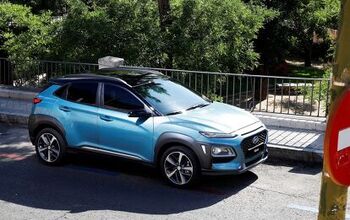Hyundai's Subcompact Crossover Has a Name: 'Kona'

After its skyrocketing post-recessions sales hit a roadblock in the United States, Hyundai can’t wait to sell Americans more crossovers. It just needs to build them first.
While the Korean automaker already has plans to tinker around with its existing utility lineup, it lacks product on the small end of the scale, which currently gives rivals an edge.
Well, not for long.
Today, Hyundai revealed the name that will soon join the subcompact CUV fray — Kona. Overseas markets will see the Kona in the second half of this year, but those all-important U.S. buyers will have to wait just a little while longer.
If you’re familiar with Hawaii, you’ll know the Kona name isn’t derived from anything Korean. A district on the west coast of the Big Island, Kona sounds like paradise to anyone who has to suffer through windshield scraping and block heater repair. It also sounds very global, key for a mass-market model.
Hyundai furnished us with a teaser image, but there’s not much else to go on besides Hyundai’s claim that the Kona will arrive with “bold, striking design and high interior refinement and spaciousness” — something we’ve heard about every product from every automaker. You’re guaranteed narrow LED headlights, folks.
Contrary to early reports, there won’t be a Kona at the New York Auto Show. According to Derek Joyce, Hyundai Motor America’s product public relations manager, the automaker plans to use the venue to get buyers interested in the refreshed 2018 Sonata.
“At this time, we can only confirm the Kona name and that it will compete with other B-segment CUVs, broadening Hyundai’s impressive CUV line-up,” said Joyce. “Kona will launch in the Korean domestic market in the summer of 2017 and in the U.S. market in early 2018.”
Product details should be available in the near future, he told TTAC.
With Ford targeting the U.S. with its overseas-market EcoSport and Toyota entering the B-segment game with its C-HR, Hyundai needs a product to rebuff those models, as well as Mazda’s CX-3 and Honda’s H-RV. An A-segment CUV could follow the Kona, but that market isn’t nearly as important. Meanwhile, Hyundai plans to grow the Tucson and Santa Fe Sport slightly, with the range-topping Santa Fe due for eight-passenger capacity and a name change.
[Image: Hyundai Motors]

More by Steph Willems
Latest Car Reviews
Read moreLatest Product Reviews
Read moreRecent Comments
- Varezhka I have still yet to see a Malibu on the road that didn't have a rental sticker. So yeah, GM probably lost money on every one they sold but kept it to boost their CAFE numbers.I'm personally happy that I no longer have to dread being "upgraded" to a Maxima or a Malibu anymore. And thankfully Altima is also on its way out.
- Tassos Under incompetent, affirmative action hire Mary Barra, GM has been shooting itself in the foot on a daily basis.Whether the Malibu cancellation has been one of these shootings is NOT obvious at all.GM should be run as a PROFITABLE BUSINESS and NOT as an outfit that satisfies everybody and his mother in law's pet preferences.IF the Malibu was UNPROFITABLE, it SHOULD be canceled.More generally, if its SEGMENT is Unprofitable, and HALF the makers cancel their midsize sedans, not only will it lead to the SURVIVAL OF THE FITTEST ones, but the survivors will obviously be more profitable if the LOSERS were kept being produced and the SMALL PIE of midsize sedans would yield slim pickings for every participant.SO NO, I APPROVE of the demise of the unprofitable Malibu, and hope Nissan does the same to the Altima, Hyundai with the SOnata, Mazda with the Mazda 6, and as many others as it takes to make the REMAINING players, like the Excellent, sporty Accord and the Bulletproof Reliable, cheap to maintain CAMRY, more profitable and affordable.
- GregLocock Car companies can only really sell cars that people who are new car buyers will pay a profitable price for. As it turns out fewer and fewer new car buyers want sedans. Large sedans can be nice to drive, certainly, but the number of new car buyers (the only ones that matter in this discussion) are prepared to sacrifice steering and handling for more obvious things like passenger and cargo space, or even some attempt at off roading. We know US new car buyers don't really care about handling because they fell for FWD in large cars.
- Slavuta Why is everybody sweating? Like sedans? - go buy one. Better - 2. Let CRV/RAV rust on the dealer lot. I have 3 sedans on the driveway. My neighbor - 2. Neighbors on each of our other side - 8 SUVs.
- Theflyersfan With sedans, especially, I wonder how many of those sales are to rental fleets. With the exception of the Civic and Accord, there are still rows of sedans mixed in with the RAV4s at every airport rental lot. I doubt the breakdown in sales is publicly published, so who knows... GM isn't out of the sedan business - Cadillac exists and I can't believe I'm typing this but they are actually decent - and I think they are making a huge mistake, especially if there's an extended oil price hike (cough...Iran...cough) and people want smaller and hybrids. But if one is only tied to the quarterly shareholder reports and not trends and the big picture, bad decisions like this get made.


































Comments
Join the conversation
Kona bicycles is still in business - did Hyundai have to pay them anything to use the name? Or is it a non-issue, since these are cars? Also, remember the Kona Edition Focus, that came with a bike rack, and a Kona bike? I still see one of those occasionally.
Guess Ford has to change the name of their dark blue paint...